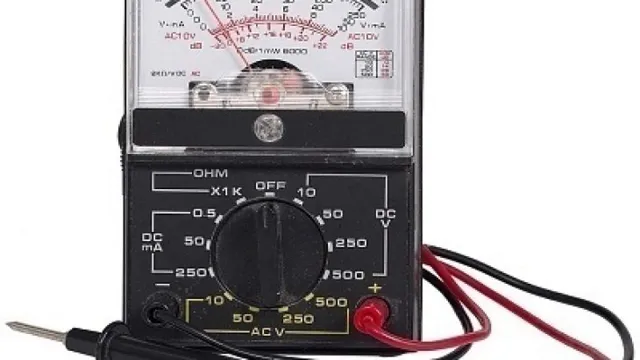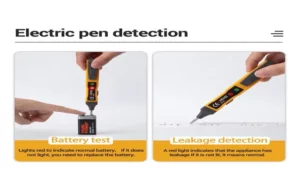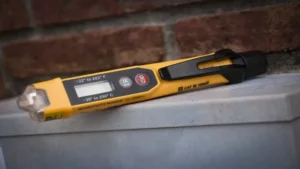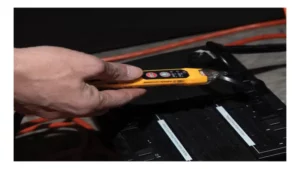If you’ve ever worked with electrical systems, then you likely know how crucial it is to have the right tools to ensure your safety. One of those tools is a voltage tester, an essential device for anyone working with electrical current. At its core, a voltage tester is a tool used to detect the presence of electrical voltage in an electric circuit.
It works by measuring the electrical potential difference between two points in a circuit, helping you determine whether a conductor is energized or de-energized. Think of a voltage tester like a blood pressure cuff for a circuit. Just as a blood pressure cuff helps a doctor measure the pressure in your veins and arteries, a voltage tester allows electricians to measure the electrical pressure in a circuit.
By using this tool, electricians can perform repairs, maintenance, and installations safely and accurately. Without a voltage tester, you could be gambling with your safety. Loose or damaged wires, faulty outlets, and other electrical hazards can result in serious injury or even death.
By using a voltage tester, you can quickly and easily test whether a circuit is carrying electrical energy before you begin working on it. Whether you’re a seasoned electrician or a DIY enthusiast, having a voltage tester in your toolkit is essential. It’s a small investment that can pay off in a big way, helping you keep yourself and your loved ones safe while working with electricity.
Understanding Voltage Testing
Voltage testers are essential tools that help electricians and technicians to determine the presence of electricity in a wire or a circuit. But what does a voltage tester do exactly? Well, it measures the amount of voltage, or electrical potential difference, between two points in an electrical system. The device usually consists of a probe and a display screen, and can be used to measure both AC and DC voltage.
With a voltage tester, you can check if a circuit is energized or de-energized, locate and troubleshoot electrical issues, and ensure the safety of yourself and others around you. However, it is important to note that voltage testers only provide a rough estimate of the amount of voltage present, so it’s crucial to use them along with other tools and procedures to ensure accurate and reliable measurements.
Voltage Tester Definition
A voltage tester is an important tool that is used to measure the voltage or electrical potential difference between two points in an electric circuit. It is essential to ensure that electrical systems are functioning correctly and safely. This device is commonly used by electricians and those who work with electrical appliances and wiring.
The tester measures the voltage by detecting the presence of an electric field created by the difference in potential between the two points in question. One of the advantages of using a voltage tester is that it can identify if a particular circuit has voltage present or not, which can help to avoid electrical shock or electrocution. Additionally, voltage testers can help to diagnose a variety of electrical problems, including faulty wiring, bad switches, and broken fuses.
To use a voltage tester, one must follow proper safety procedures and ensure that the tester is functioning correctly before use.

How Voltage Testing Works
Voltage testing is a crucial step in ensuring the safety of electrical appliances and devices. It is used to determine the amount of electrical potential difference, or voltage, present in a particular circuit or device. This is done by using a device called a voltmeter or multimeter, which measures the voltage in volts (V).
Typically, a voltmeter is connected to the circuit or device being tested, and the voltage is measured in either AC or DC voltage. Understanding voltage testing is important because it can help prevent electrical hazards such as electrical shock or fire. By regularly testing electrical devices, you can identify potential issues and take necessary steps to fix them before they become a safety hazard.
In summary, voltage testing is a crucial step in maintaining electrical safety, and by understanding how it works, you can take important steps in preventing accidents in your home or workplace.
Different Types of Voltage Testers
A voltage tester is an essential tool for any electrician or DIY home renovator. It is used to test the presence of electrical current in wires, circuits, and outlets. There are three different types of voltage testers, including non-contact, contact, and circuit testers.
A non-contact voltage tester, also known as a “tick tester,” detects the presence of electricity without making direct contact with the wires or circuits. This type of tester is simple to use, relatively inexpensive, and perfect for quickly identifying the presence of voltage in wires within a wall or other hard-to-reach areas. A contact voltage tester, as the name suggests, requires direct contact with the wires or circuit to detect the presence of voltage.
This type of tester is best used when working with exposed wires and circuits, as it ensures that the voltage is present before proceeding. Circuit testers, on the other hand, are more advanced voltage testers that offer a wider range of functions, such as continuity testing, circuit tracing, and voltage measurement. These testers are often used by professional electricians to troubleshoot complex electrical problems in homes and businesses.
Overall, voltage testers play a crucial role in ensuring electrical safety and preventing hazardous accidents. Whether you’re a professional electrician or a DIY enthusiast, having a reliable voltage tester is a must-have tool for any electrical project.
Non-Contact Voltage Testers
Non-Contact Voltage Testers Voltage testers are essential tools for anyone who works with or around electrical systems. They help to identify and measure the presence of electric current in wires, circuits and devices, which is important for troubleshooting and ensuring the safety of both workers and equipment. Non-contact voltage testers are a popular and convenient option for detecting live electricity without having to make direct contact with a wire or terminal.
There are several different types of non-contact voltage testers available, including capacitive, inductive and high-frequency models. Each type works slightly differently, but they all rely on detecting the electromagnetic field generated by electric current in order to indicate the presence of voltage. Capacitive testers are sensitive to electric fields and are typically used for low-voltage applications, while inductive testers use a magnetic field to detect voltage and are good for testing higher-voltage systems.
High-frequency testers are able to detect voltage even in crowded or noisy environments, making them ideal for complex electrical systems. No matter which type of non-contact voltage tester you choose, it’s important to follow safety guidelines and use caution when working with electricity.
Contact Voltage Testers
Contact voltage testers are essential tools that every electrician and DIYer should have in their toolbox. These testers are used to check the presence of electrical voltage in a certain area to ensure that it’s safe to work on or around. There are different types of voltage testers available in the market, each with its own unique features and benefits.
The most common types of voltage testers are non-contact testers, proximity testers, and voltage testers with an audible alarm. Non-contact testers are a popular choice among electricians as it can detect voltage without even touching the wire. Proximity testers, on the other hand, must be brought close to the electrical source to detect the voltage.
Lastly, voltage testers with an audible alarm are the most efficient type as it alerts the users through an audible sound if voltage is detected. No matter what type of voltage tester you choose, always remember to prioritize safety and follow the manufacturer’s instructions carefully.
Uses of Voltage Testers
“What does a voltage tester do?” A voltage tester is a handy tool that helps electricians and DIY enthusiasts determine the presence, strength, and polarity of an electric current in a particular circuit. It can come in many forms, including a simple neon screwdriver, a digital multimeter, or a non-contact tester. These testers can detect voltage levels ranging from low-voltage DC currents to high-voltage AC currents.
Electricians can use voltage testers to check for continuity, broken circuits, and faulty outlets, sockets or switches. For instance, by using a voltage tester, one can determine whether the power outlet is working correctly or if there is an issue with the wires or the switch. Additionally, voltage testers can prevent users from electrocution by alerting them of the presence of voltage in damaged electrical cables or wires, enabling them to take appropriate measures to prevent accidents.
In conclusion, owning a voltage tester is essential for anyone handling electrical work, and it can help to ensure safety and efficiency in handling electrical circuits.
Electrical Safety Inspections
If you’re concerned about electrical safety, one of the most important tools to have in your toolkit is a voltage tester. These small devices can be used to test the presence and strength of electrical current in wiring, outlets, and appliances. They’re especially useful when conducting electrical safety inspections in your home or workplace.
By using a voltage tester, you can quickly identify potential hazards such as breaker malfunctions or overloaded circuits, allowing you to take corrective action before serious damage occurs. Think of a voltage tester like a smoke detector for your electrical system – both provide early warning of potential danger, allowing you to take steps to protect yourself and your property. So if you’re planning on performing any electrical work or simply want to ensure that your home is safe, investing in a quality voltage tester is a smart and practical choice.
Troubleshooting Electrical Issues
Voltage Testers If you’re experiencing electrical issues in your home, a voltage tester can be a valuable tool to have on hand. These testers are used to determine if there is voltage present in a particular electrical system. By using a voltage tester, you can identify which circuits are live and which ones are not, making it easier to troubleshoot any issues.
There are different types of voltage testers available, including non-contact testers, which are the most commonly used. These testers work by detecting electrical fields rather than making contact with the circuit. They are easy to use, and you don’t need to worry about accidentally touching a live wire.
On the other hand, contact testers require direct contact with the circuit to determine if there is voltage present. These testers are useful if you need to measure the exact amount of voltage present in the circuit. Additionally, there are more advanced voltage testers available that can measure different types of electrical signals, such as frequency and capacitance.
If you are not comfortable working with electricity, it’s best to hire a professional to assist you with any electrical issues you are having. However, if you do decide to use a voltage tester, always make sure to follow safety protocols and wear protective gear. Overall, voltage testers are an essential tool for anyone who needs to troubleshoot electrical issues, whether you are a homeowner or a professional electrician.
By using a voltage tester, you can ensure that you are working safely and effectively, and that you are identifying the root cause of any electrical problems you may be experiencing.
Conclusion
In conclusion, a voltage tester is like a superhero for your electrical work, helping you identify and measure the power flowing through your circuits with ease. It’s like having a trusty sidekick at your side, allowing you to spot potential hazards and make necessary repairs before they turn into a crisis. So, whether you’re a seasoned electrician or a DIY enthusiast, a voltage tester is an essential tool for ensuring your safety and the longevity of your electrical system.
Trust us, don’t be caught without one!
FAQs
What is a voltage tester?
A voltage tester is a tool used to check if an electrical circuit is live or not.
How does a voltage tester work?
A voltage tester works by measuring the voltage in an electrical circuit and indicating if it is live or not.
What are the different types of voltage testers?
The different types of voltage testers include non-contact voltage testers, contact voltage testers, and multimeters.
What is a non-contact voltage tester?
A non-contact voltage tester is a type of voltage tester that can detect the presence of an electrical field without coming into physical contact with the circuit.
What is a contact voltage tester?
A contact voltage tester is a type of voltage tester that requires physical contact with the circuit to measure the voltage.
What is a multimeter?
A multimeter is a tool that combines several functions, including measuring voltage, current, and resistance, in one device.
Can a voltage tester be used to measure current?
No, a voltage tester is not designed to measure current. To measure current, you need a separate tool called an ammeter.






